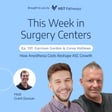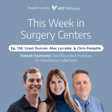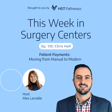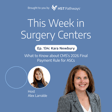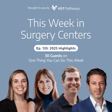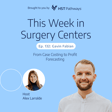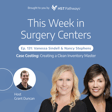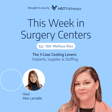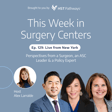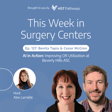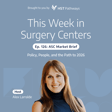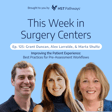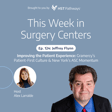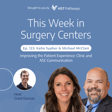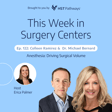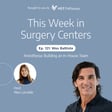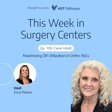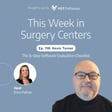Introduction and Episode Preview
00:00:01
Speaker
Welcome to This Week in Surgery Centers. If you're in the ASC industry, then you're in the right place. Every week, we'll start the episode off by sharing an interesting conversation we had with our featured guests, and then we'll close the episode by recapping the latest news impacting surgery centers. We're excited to share with you what we have, so let's get started and see what the industry's been up to.
00:00:27
Speaker
Hi, everyone. Here's what you can expect on today's episode. First, if you can't tell, I'm feeling a little under the weather. I don't know who gets sick in June, ah but apparently it's me. So please excuse my voice for the rest of the episode, but the show must go on.
Series Context and Guest Introduction
00:00:44
Speaker
So today kicks off our third and final part of our Capitalizing on the Cardiology Boom series. And we are closing out the series with Dr. Joseph Puma. Dr. Puma is the founder of Soren Medical and the founder and president of the New York Ambulatory Cardiovascular Society.
00:01:05
Speaker
New York does not currently allow CV procedures to take place in an ambulatory setting. So Dr. Puma is working with many organizations to try to change this. And I had a chance to sit down and ask Dr. Puma about the most common concerns he hears when he is advocating from surgery center leaders and governing bodies. And we got into the year's worth of positive outcomes he has compiled and where we go from here. In our news recap, we'll cover the latest from Change Healthcare, care the highest paid ASC specialty, the top citations from CMS in 2023, and of course, and the new segment with the positive story about a new fingerprint test for Parkinson's.
Ambulatory Cardiology: Opportunities and Trends
00:01:52
Speaker
Hope everyone enjoys the episode and here's what's going on this week in Surgery Centers.
00:02:01
Speaker
Dr. Puma, welcome to the podcast. Thank you. Thanks for inviting me. Can you please share a little bit about yourself with our listeners? Sure. My name is Dr. Joseph Puma. I'm the founder and president of Sorin Medical, which is the largest independent interventional cardiology and vascular practice in New York City, and also the founder and president of the New York Ambulatory Cardiovascular Society, advocating for cardiovascular procedures in the ASC.
00:02:35
Speaker
Perfect. Yeah. <unk>s I know you work a lot with the New York State ASC Association and that is how we got in touch. So we appreciate all of your advocacy. So we've talked a lot about recent trends that are pushing ah CV cases to outpatient facilities, but we've primarily focused on the drivers being around new additions to the ASC covered procedures list and payer benefits, but can you share a few other correlated trends you're seeing in healthcare care right now that are also supporting this movement? Sure. I think there's a variety of reasons, Erica, why cardiovascular procedures are now on deck, if you will, to move to ambulatory surgical centers. Coronary stenting procedures are now safe, can be done on an ambulatory basis.
00:03:28
Speaker
with alternate access techniques, that is radial artery access. Patients can literally go home in just a few hours with a band-aid on their wrist. In addition, there was some unintended consequences, I believe, from the Affordable Care Act, where physicians could no longer own hospitals.
Advantages of Outpatient Cardiac Procedures
00:03:49
Speaker
And so cardiovascular physicians historically, certainly for the past 30 or 40 years, have been as aggressive and innovating improving quality, safety, access to care, technology, the devices that we use. and And I believe they're looking for an outlet to do their procedures. Hospitals, in addition, hospital-employed physicians have lower job satisfaction. Patients
00:04:20
Speaker
as anyone who runs an ASC know, prefer to come to an ambulatory surgical center as opposed to going to the hospital. And I think one of the critical pieces of information or data that most ASC owners may not be aware of is about 45% of all cardiac procedures done in a hospital nationwide are elective anyway. So these aren't inpatients, these are elective outpatients and are only going to the hospital because they have to. Yeah, that's really interesting. When you've spoken with surgery centers who are hesitant about adding CV cases though to their surgery center, what are the the main concerns that you're hearing? Unlike every other specialty is a very emotional topic for people. There's this sense that
00:05:16
Speaker
these patients are higher risk, higher acuity, that there's a higher complication rate.
Addressing Concerns of Cardiac Procedures in ASCs
00:05:23
Speaker
And the reality is that's just not true. Now in part, one of the reasons people have that sense is because but if you watch the media or you watch television, the only cardiac related patients that are usually reported on are the local celebrities that had a heart attack in their 40s or you watch shows like ER r or things like that. And they never show an elective outpatient procedure. They show someone who's having a cold blue being brought in through the yeah ah ER, you're paddling their chest. The primary issue for ASC owners right now, as I've talked to ASC owners around the country,
00:06:01
Speaker
is fear. And who are the appropriate patients? What are going to be the criteria for outpatient PCI in particular? Since that's the most common procedure that'll be done. Percutaneous coronary intervention, PCI, which is basically a stent procedure. Yeah. I don't think Grey's Anatomy did anyone any favors in this scenario. That's true. Interestingly, just add one point to that. the So there's the emotional part, right? The other part are the exact same list of issues ASCs have when they bring any new procedure into their facility. Who are the physicians that are going to perform it? What's their skill level or what should be their competence level? How do we credential them? What are the criteria?
00:06:56
Speaker
that should be met for an outpatient elective procedure versus an inpatient. okay And at least in cardiology, the interesting thing is we have about 20 years of data already. of performing elective outpatient stent procedures in hospitals without surgical backup. And for all intensive purposes, an ASC is a hospital without cardiac surgical backup. So there's 20 years of excellent data with clear criteria of the appropriate patients to demonstrate that the that
00:07:37
Speaker
PCI or cardiac procedures in an ASC is both safe and effective from a medical standpoint. Yeah. Yep. That makes sense. so As all too well, CV cases are not approved to be performed in in an ASC setting in all 50 states. so When you do lobby and you do speak with the Department of Health and and other governing bodies, what are their primary concerns?
Regulatory and Economic Challenges
00:08:05
Speaker
What are their roadblocks? you know That's a great question. To give that a little background, for the most part, we got to go back a little. In January 2022, outpatient cardiac procedures were approved by CMS. There was a whole list of CPT codes they said they would now pay for in ASCs. They had given the world about a six-month heads up, so some ASCs were prepared.
00:08:29
Speaker
In general, the initial wave of ASCs doing cardiac procedures were in states without certificate of need. And over the past three years, several states with certificate of need have either had a legislative carve out like Pennsylvania, for instance, which the governor signed July of 2023 to allow coronary procedures and cardiac procedures in the ASC. Other states like South Carolina, for instance, because of the debate, the entire CON law was done away with.
00:09:09
Speaker
So right now, there's about 25 or 26, I believe at last count, as of about two weeks ago, of states that are either already allowing or will be allowing cardiac procedures to be done in the ASC. The Northeast is probably the furthest away because their CON laws are the strictest. Now, what are the issues? Issue number one, I met with the Department of Health um in New York State just a couple of weeks ago on Lobby Day up in Albany before the legislative session ended. Issue number one is what's the criteria for these patients? How do we oversee it? How do we ensure that only appropriate patients are undergo the procedure in an ASC? And that should be a reasonably easy hurdle
00:10:01
Speaker
to overcome, especially in a state like New York, where for 20 plus years, cardiac outcomes, surgical and PCI have been monitored by the state and all the doctors get a report card. You could look it up online. The second issue though, is a concern about a loss of revenue from critical need hospitals. Because as you're aware, and as I'm sure many ah who are watching this are aware, nationally, but especially in the Northeast and New York, hospitals are closing. The large hospital systems that consolidated since 2010 when the Affordable Care Act was passed are now shedding some of their smaller community hospitals.
00:10:50
Speaker
And so now the state is concerned, especially after the challenges every state had, but especially New York during COVID where we didn't have enough hospital beds for the sick, they're very concerned that the loss of revenue to these hospitals for cardiac procedures might damage the health, the economic health and the and of these critical access hospitals. And third, in states where unions are very strong, both the nurses union and the hospital associations are not particularly excited about it. But again, that's a primarily economic issue, not really a healthcare issue. Yeah. How do you overcome number two and number three? it Because they're right, no?
00:11:44
Speaker
from two might be right. Critical access hospitals. Yeah. And that's going to require a lot of discussion. That's going to require a lot of discussion. But let's make no bones about it. Hospitals are pretty good at making economic decisions, but they're not that great at making health care decisions anymore. And in part because physicians aren't allowed to own hospitals. Most hospitals are now parts, they're conglomerates. It's corporate practice of medicine. All the things most of us ASC owners or independent practices are not allowed to do or were never allowed to do. But you know the nursing union issues
00:12:24
Speaker
um Those seem to be business issues that doesn't necessarily mean we can't get over them. But both number two and number three are out cross purposes to what most politicians say are their stated goals, increasing access to care, especially in underserved communities.
Future of Cardiac Procedures in ASCs
00:12:43
Speaker
increase quality of care and lowering costs. So where I believe most of this will end up in most states is that the states are going to have to do it because it will reduce cost and it's going to be pushed by the state Medicaid budgets, which are, you know, in New York state, I believe we have a $4 billion dollars but deficit just from Medicaid.
00:13:09
Speaker
and then also the insurers. Some insurers, national insurers like Aetna, are now proactively trying to direct their members to ambulatory surgical centers for any procedure that's required because it's safe, effective, and less expensive. Even if their doctor doesn't go to an ASC, they will help you find a physician who goes to an AOC. So at the end of the day, this is going to be an economic proposition for most state budgets and insurers. Yeah. One more question on the hospital piece. In other states that do allow CV procedures, has that been an issue or New York is just assuming and proactively thinking that might be an issue with no data to back it up?
00:14:03
Speaker
I would point to, let's point to two different states. Let's take all the non-certificate of needs states as one. It hasn't been an issue in part because legally the the hospitals couldn't make an issue out of it because there's no CON. Okay. And most of those hospitals have operated for years understanding there's no CON. So there's already no orthopedics, no gastroenterology, no ophthalmology. right
00:14:34
Speaker
Urology, all the traditional specialties that have already migrated out of the hospital. But then let's take South Carolina as a specific example. And in South Carolina last summer, there was a group that put together to, were approved to build an ambulatory surgical center. And literally after it was approved or right at the time of approval, the local hospital filed a lawsuit used all these arguments. But ultimately, I think the ultimately the the lawsuit couldn't go through and the government, the the legislature did away with CONs altogether. So so I i think that gaining access, especially to underserved communities where there's great disparities in care. It's very hard to say having your procedure at an A.S.C. or seeking attention
00:15:29
Speaker
at a facility other than a hospital is a bad idea. It's a very good idea. As long as we already have 20 years of data that it's high quality, safe and effective, and lower cost. So I think we've already seen this play out. In certain states like New York where the the Nurses Association, the Hospital Association are particularly powerful, unions are particularly powerful, we're we're trying to negotiate by raising awareness, educating, and throughout society, building a groundswell. It's not gonna be easy, it's not gonna happen tomorrow, but it will happen. Yes, I believe in you. So you've mentioned safety a ah bunch, right? and And that's been proven. So for those who still might have some concerns, what what advancements in technology and procedural techniques have made outpatient CV procedures now safe and and effective?
Technological Advancements in Cardiology
00:16:28
Speaker
so the So it's a great question. I recently had a discussion, a Zoom call with the New Jersey Ambulatory Surgical Center Society. And I'll be giving a talk there, I believe at the end of July. And this was their number one question. And so I posed it, I flipped it back onto them. I said, so in your facilities, you intubate patients for your procedures. And they were like, oh yeah, sure, we do that every day. And they were very proud of their record of safety and good outcomes.
00:17:01
Speaker
And so I said, but intubating a patient is often moments of terror, right, with the greatest chance for a catastrophic outcome, correct? And they all acknowledge that. So point number one, coronary patients do not get intubated. They get conscious sedation only. That's a key thing. Point number two, cardiac patients have the most extensive monitoring. They're all getting intra arterial blood pressure monitoring, heart rate monitoring. So from a monitoring perspective, it's greater than you generally do, even in your ASC for the cases you do today.
00:17:48
Speaker
And then third, with the advances in smaller sheet size. So now we can do a catheterization through a radial artery, an artery in your wrist, through a four French catheter, and even do a stent procedure through there. So the equipment is so much smaller, The physician experience is so much greater and since we use stents primarily to treat coronary disease, stents
00:18:23
Speaker
obliterate, if so to speak, over 95% of the complications that you would previously have in the cath lab, where you had a dissected artery or some damage to the artery. And so many of the complications, so it's interesting, when I trained fellows, and I've trained fellows for most of my 35, 40 year career, Many of the complications that could happen to the fellows I'm training, they read about it in a book, but they've never experienced it because the procedure has become so advanced now, the technology is so good, our experience is so good.
00:19:02
Speaker
Whereas for me, those complications are still visceral since I lived through all of them in 1990 and 1995 before we had stents. So there are significant advances. Now that doesn't mean, let me be clear, that doesn't mean that any e ASC who wants to incorporate coronary intervention or electrophysiology procedures will need training, specialized equipment, and even specialized techs who have worked in a cath lab before. But if your ASC is already doing vascular procedures, you're more than three quarters of the way there already.
00:19:47
Speaker
That's great. yeah we The last two episodes we did actually, we covered a lot of the the staffing needs and the equipment needs and the costs and things like that. Our listeners should be very well versed on that side of the house. You've mentioned PCI now. Can you dive into that one a little bit more? What have been the successful patient outcomes from those PCI procedures specifically? and So nationally, if you look at the Society for Cardiac Angiographies and Interventionalists, who database outcomes in facilities without surgical backup, as well as in ASCs, they have written a position paper where they have clearly said that outpatient PCI is both safe and effective. And there's no statistical difference in outcomes in these patients.
00:20:42
Speaker
as opposed to being done in a hospital. Both the ACC and the American College of Cardiology, American Heart Association, and SCI have position papers on this that are read readily available online, and you can find literally thousands and thousands of cases that have already been done with the outcomes. Most PCI procedures are ambulatory, Patient comes in in the morning like any surgical procedure, NPO, six to eight hours earlier. They get an IV. They get conscious sedation, typically versed and fentanyl. So quick action and wears off quickly. And then they get an intra arterial sheath and usually their radial artery. In patients who have higher acuity, kidney dysfunction,
00:21:37
Speaker
history of congestive heart failure, damaged heart muscles, or certain anatomy in their arteries, those are patients we would do in a hospital. And those are patients who should appropriately be done in a hospital. But that's only about 20% of the outpatient population. So just to put it in perspective, about a million PCIs are done every year. And 80% could likely be done in an ambulatory surgical center. In addition, more advanced procedures now, um on a conference call I was on two weeks ago, folks up in Richmond, Virginia, which were approved in the past year, they're even doing electrophysiology procedures. In fact, the the the lead physician in that group told me, they're so busy with electrophysiology procedures, doing ablations,
00:22:33
Speaker
pacemakers, defibrillators, that they're already in the process of building a second lab so they can handle their coronary procedures. And their outcomes have been excellent. Patients in and out same day. Recovery for most procedures is two to four hours. Wow, that's unbelievable. Thank you for all the great advice. One last question for you. We do this every week with our guests. What is one thing our listeners can do this week to improve their surgery centers? and i've listened I always listen to your podcast, so I had a feeling that question might be coming. and Because of that, it was interesting. I didn't want to answer it on my own. I knew what my answer would be, but I went to my executive director a couple of days ago and I asked her,
00:23:22
Speaker
and And then I went to our chief operating officer and I asked him, and it was interesting what they said. Her answer was, she would improve workflow, that there's always benefits, ah opportunities for workflow improvement for the patient. His answer was really interesting. He would get hospitality training for everyone that works in our ASC, as well as in our other offices, ah because he thought there would be great benefit to even further differentiate yourself from the hospitals. My answer would be, at the end of the day, we have plenty of data that demonstrates high volume practitioners and high volume centers deliver the best outcomes. And if you were planning
00:24:14
Speaker
to start performing coronary procedures whenever that is. Since you're going to need some lead time for additional equipment or stuff, my answer would be start working on building your network right now of the physicians that would utilize your facility and expand it both on the horizontal and the vertical as quickly as you can because ultimately the best practitioners by volume and the best facilities by volume will make you a real star in your community. That is excellent advice and thank you for the the bonus advice from your team as well. yeah Thanks so much for inviting me. Yeah, it was great talking to you. Thank you.
Change Healthcare Data Breach Recap
00:25:02
Speaker
As always, it has been a busy week in healthcare, so let's jump right in. As you all know, Change Healthcare experienced a ransomware attack in late February, which caused significant disruptions to healthcare operations, such as patient payments, eligibility checks, prior auth, prescription fulfillments, and the list goes on. So Change Healthcare is owned by United Health Group, and they are now in the process of reviewing the personal information involved in the attack. While full medical histories of patients have not been breached, information from those who paid healthcare bills has been exposed, and that could include contact info, health insurance details, medical diagnoses, test results, billing and payment info, and even social security numbers. So why are we talking about this right now? The company has faced a lot of criticism from lawmakers for delaying data breach notifications.
00:26:02
Speaker
So Senators Maggie Hassan and Marsha Blackburn have urged UnitedHealth to send notifications to affected individuals by June 21st, citing violations of HIPAA privacy laws. In response, Change Healthcare does plan to start notifying its customers about the data breach. The notifications to affected individuals will begin in late July, although they did note that not everyone may receive one due to incomplete address information. So the mess and saga continue. UnitedHealth reported that the breach might have affected up to one third of the population, which means potentially one third of those listening might be receiving a letter in the mail this summer. So as always, I'll keep a close eye on this story and share any pertinent updates.
Trends in ASC Specialties and CMS Insights
00:26:55
Speaker
In our second story, Becker's ASC recapped Medscape's 2024 physician compensation report and shared that the highest paid ASC specialty is now orthopedics. The average orthopedic surgeon has an average salary of $558,000. For the last three years, so 2021 to 2023, the highest paid specialty was plastics. Ortho has taken the number one spot again for the first time since 2020. And there are actually a few reasons for this. So first, the higher acuity cases have been shifting to outpatient settings. So orthopedic procedures are becoming more and more commonplace. We've talked about that a lot. And then also in 2023,
00:27:43
Speaker
the number of orthopedic procedures in ah in outpatient settings was 33 times higher than the volume of inpatient procedures. And that was according to the American Joint Replacement Registry's annual report. And to give you even more context, from 2019 to 2023, the number of knee replacement procedures alone that occurred in the outpatient setting increased by 200. All that to say, we're crediting ortho surgeons making the most this year because of the influx of procedures, which makes a ton of sense.
00:28:18
Speaker
And in HST's State of the Industry report, we determined that um orthopedics has the highest average net revenue per case, which also tracks with the other reports we're seeing, actually averaging $5,449 per case. And lastly, with CMS adding five ortho codes in its final rule of 2024, this specialty will only continue to grow. Let's talk about CMS health surveys. So typically, CMS publishes a quality certification and oversight report that allows the public to pull citation frequency reports for both health surveys and life safety codes. However, due to some systems issues, CMS has not been able to update the data since May of 2022.
00:29:05
Speaker
So of course, ASCA has come to the rescue. They took the initiative to ask CMS directly for the 2023 figures, even though they weren't on the site and they came through. So here's what CMS shared and what ASCA has introduced from the data. The first thing to know actually is that the 2023 survey data includes citations given during 3,023 ASC surveys. So we'll just call it 3,000 to make life easy. And the number of surveys is higher than in past years because it includes info from state agencies and deemed status survey data from accrediting organizations. So here's a list of the most frequent to least frequent citations for CMS health surveys. The first is Sanitary Environment that had 507 citations. The next is Infection Control Program
00:30:02
Speaker
environment, administration of drugs, infection control, physical environment, form and content of record, governing body and management, reappraisals, and then the 10th is notice of rights. My biggest takeaway, which I'm sure you're all thinking too, is that you can see from that list that infection control remains an area of focus for CMS for sure.
00:30:28
Speaker
And then here's a list of the most frequent to least frequent citations for the life safety code surveys. The most frequent citation was for building safety that had 339. And then going down from there, it was electrical systems, sprinkler systems, fire alarm systems, fire drills, emergency lighting, maintenance inspection and testing of the doors, safety from fire, electrical systems again, but this time just maintenance and testing, multiple occupancies, and then the tenth was exit signage.
00:31:10
Speaker
So I'll provide a link to the article in the episode notes if you want to see the list for yourself. I know I'm a visual learner, so it's hard to comprehend, audibly hearing the lists. I always think it's a little easier to see it anyway, but I do think these lists are super helpful. So you know what might what is likely top of mind for CMS in 2024 and when you're having these surveys done yourself. And to end our new segment on a positive note, An AI enhanced finger prick test for Parkinson's could help predict the disease seven years before the onset of symptoms.
00:31:44
Speaker
Researchers from University College London partnered with colleagues at Germany's University Medical Center to ah do the study, which trained an AI model to spot blood biomarkers in patients with Parkinson's. It went on to correctly forecast the disease in 16 out of 72 patients considered at risk of the condition and one case seven years before symptoms appeared. The discovery opens up the possibility of using early treatments to slow the onset of Parkinson's or even stop it in its tracks. Parkinson's is such a terrible diagnosis for the patient and their loved ones. So if researchers could catch the diagnosis sooner, then there is much more time for testing preventative options and treatments that could help these patients live longer and more comfortable lives. Excellent work to everybody in London and Germany on working on this new finger prick test.
00:32:43
Speaker
And that officially wraps up this week's podcast. Thank you as always for spending a few minutes of your week with us. Make sure to subscribe or leave a review on whichever platform you're listening from. I hope you have a great day and we will see you again next week.

